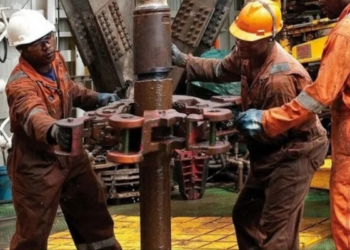Once upon a time, Nigeria discovered oil. Soon enough, it became our main source of livelihood, the foundation upon which our national budget rests, and the one commodity that provides most of our forex inflows. To be able to extract value from this oil, we created refineries – all of which are government-owned and managed. Sadly, the rest of the story includes heavy bouts of politicking, lots of bloodshed, corruption, explosions, and billions of Naira in losses. Oil might have been one of Nigeria’s biggest blessings, but it also undoubtedly doubles as its biggest curse.
On Monday, the Nigerian National Petroleum Company (NNPC) released its audited financial statements for 2018, noting that its refineries recorded losses of N154 billion. As embarrassing and disappointing as it sounds, it is not as surprising. The nation’s 3 refineries located in Port Harcourt, Warri, & Kaduna, reported combined losses of N154 billion. Kaduna Refining and Petrochemical Company (KRPC) incurred a loss of N64.5 billion, Port Harcourt Refining Company (PHRC) recorded a loss of N45.6 billion, while Warri Refining and Petrochemical Company (WRPC) recorded a loss of N44.4 billion. The losses also aren’t new as all refineries performed better than the preceding year 2017. The only thing more confounding than the billions in losses is the convenience with which Kaduna refinery conveniently recorded zero revenue for 2018.
The madness behind the numbers
Many issues feed into the wreckage that has become Nigeria’s refineries and most of these issues date as far back as decades prior to now with the last of the nation’s refineries built 40 years ago. For a recap, here’s an overview of some of the problems that have led us this far.
1. The 3 incapacitated refineries
As far back as the 1970s, Nigeria, Norway, and Malaysia set up national oil companies for the exploration, production, and refining of oil. So when Norway came up with Statoil (now Equinor) and Malaysia, Petronas, Nigeria created NNPC. Today, while Malaysia and Norway boast of having the biggest state-owned oil and gas companies in the world, NNPC has a long list of excuses and mind-boggling losses to show for it. While PH and Warri and in oil-producing states, Kaduna does not produce any oil. For the sake of balance and to have a national spread, some of the crudes are moved to Kaduna via pipeline. Hold that thought.
(READ MORE:NNPC GMD gives reasons for shutdown of refineries, to get private managers)
The capacity of all three refineries is also insignificant, compared to the required consumption of the nation. Hence, most of our oil is still imported because we cannot produce enough. This rate of importation is over 80% of our consumption. The existing refineries also operate significantly below capacity. Sometime last year, the refineries operated as low as 5.55 percent capacity. To increase capacity, the country carries out turnaround maintenance periodically and not only does it cost an arm and a leg, it takes months – but barely anything ever changes. Production stays low and cost stays high. Even if we turn all 3 around successfully, we have shown that we are incapable of increasing their capacity. Essentially, Nigerians will still need to import. Other factors contributing to the losses are spillages, explosions, and theft.
Yet in the midst of this, salaries and employee benefits are huge. KRPC, WRPC, and PHRC reported 13.8 billion, 13.8 billion, and 9.2 billion in employee wages and salaries, excluding directors’ remuneration, staff pension and other benefits. Given the inefficiency of the operations of the refineries, the only thing that could have been done asides creating better refineries is to have an overhaul of the entire thing and shut down the refineries. But that’s a different problem.
2: The politics of it
The first thing you’ll learn about oil in Nigeria is that everybody wants it. All of our refineries were built in the Military regime – as far back as that. Given the failure of the refineries, the first attempt to sell them off was made by former president Olusegun Obasanjo. When Umaru Yar’ Adua became president, he reversed it citing that the process lacked transparency. The fears of the unions in the oil and gas sector was also palpable as they saw the sale of the refineries as a ploy by the government to award the deal to its cronies. In November 2012, former President Goodluck Jonathan also recommended that the refineries be sold as a result of inadequate finance and under-performance, but they still remained. It didn’t take long before more issues emerged.
With developments going on in non-oil producing northern parts of the world like the State’s capital and barely any developments in the south, Niger Delta Militants sprung up and swore to wreak havoc on the entire nation. Also worthy of note is that today, President Buhari still remains the minister of petroleum.
(READ MORE:260 Nigerians set to be evacuated from India – FG)
3: The scam that is fuel subsidy
One of the most confounding things is the fuel subsidy saga. With the cost of import landed cost high, the government had thought it a great idea to subsidize fuel for the average Nigerian. Forget the question of whether we should be paying subsidies or not, how much in subsidies is the government really paying? Subsidies are based on the volume of petroleum consumed, but one unconfirmed information is how the subsidy is being calculated. Even today, NNPC and PPRA cannot agree on the volume of petrol being consumed daily in Nigeria.
If DPR says Nigeria is consuming around 38 million litres in a day and NNPC suggests that the country’s daily petrol consumption is around 50 – 60 million litres, it means there are significant discrepancies. As it is, no one knows how much subsidies Nigeria is actually paying every day and where the money is going to if we’re not actually consuming as much.
Yet, the king of all the problems is corruption
Of the series of challenges the refining space is plagued with from theft of petroleum products, to poor maintenance and a series of operational challenges, corruption ranks tops – and it isn’t news. Corruption in the downstream sector was also exposed during the subsidy probe. It revealed that some of the companies that took money for subsidy did not even import refined products at all. With marketers preferring to import, our refineries stay dormant. The funds used in Turn Around maintenance (TAM) annually also does not also contribute to any meaningful and could also be another avenue for exploiting the industry.
While Nigerians sit and watch the decay in the system fester, one billionaire is on course to provide an alternative that both the government and the private sector are basing all their hopes and dreams. Aliko Dangote’s 650,000 barrels a day refinery which is set to be one of the world’s largest, is due to start operations in less than a year’s time. Even as we hope that the refinery brings some sanity to the modus operandi and reverse the decades-old rot in the system, it too isn’t bereft of flaws. Yet, it is the only foreseeable hope we have to put an end to the joke that is our refining system and commence the process of recovery.
























I am surprised that anyone would want to dabble into the opaque world of NNPC accounting. I doubt that there would be any more clarity even if the overbloated staffing level of loafers is completely stripped. Like the government that it serves, the NNPC Refining Operations and its affiliates, is a criminal enterprise.
Excellent piece!!
Sad too.
The article exposes the stark hypocrisy of the Nigerian state. We all know NNPC shouldn’t be in the business of refining crude oil because the government of Nigeria isn’t accountable. Dangote’s refinery should hopefully end the massive corruption in the sector but don’t bet against government officials to find new ways to steal